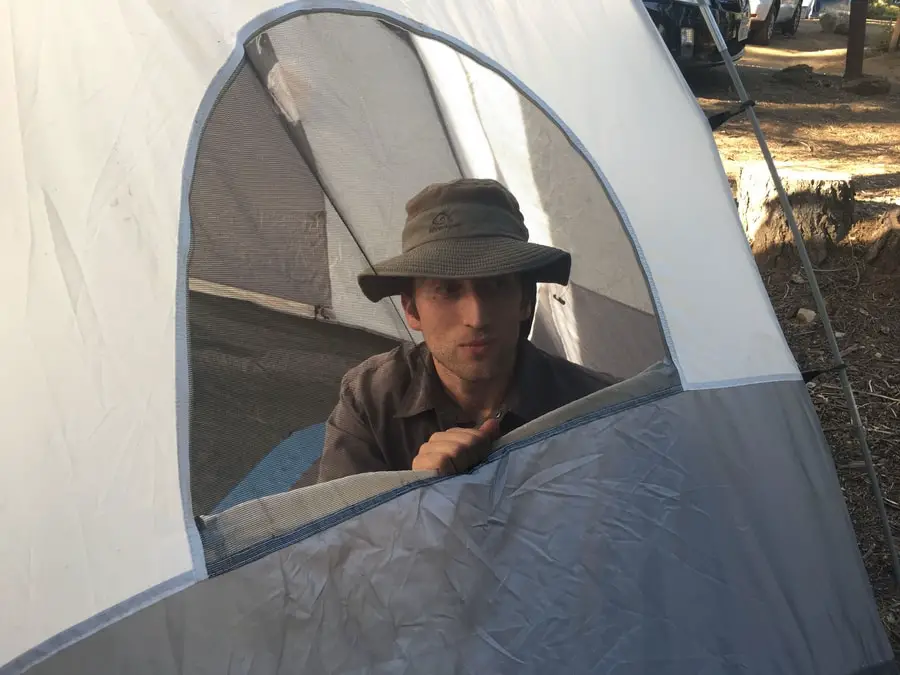
I recently went camping in the mountains and while there I experienced hoards of bugs like mosquitoes, moths, and beetles. I was laying in my tent with a light on inside and I could see dozens of bugs on the outside of my tent. Much to my dismay I then found several bugs inside of my tent! It got me thinking, are tents bug proof? How do I keep the bugs away when camping? If you have ever had a similar question then this post is for you, I did some research to find out a comprehensive answer on if tents are bug proof.
Are tents bug proof? Tents are bug proof if they have no damage since they are completely sealed when new. Bugs get into your tent when you open the door and let them in. Luckily, there are some easy ways that you can prevent bugs from wanting to come inside of your tent.
I have learned that you need to inspect your tent regularly to see if there are any small openings that could allow bugs to come in. The location of your campsite also has a lot to do with the number of bugs that will be present. There are plenty of simple and easy things to keep in mind in order to keep bugs away from your tent and your campsite.
By the way, If you are in the market for a new tent, then you should click here to see the one I recommend on Amazon.
Are tent’s bug-proof to begin with?
Brand new tents are bug proof on their own, or at least they should be. Tents should come fully sealed in order to best protect you from the elements. As a side benefit, they are able to keep the bugs away from you. Unfortunately, tents do have wear and tear that occurs over time. The most prone areas for rips and tears in a tent is in the mesh material usually located on the top of the tent. Unfortunately, tears here can invite insects in with you.
It doesn’t take much of a hole to let bugs crawl their way into your tent. The mesh part of your tent is not the only culprit. The seams of your tent are usually stitched together with taped seams to make them waterproof. If these stitches come apart and the seam taping starts to come off then it could leave an opening for bugs.
The most likely entrance for bugs to come in is when you yourself come in. Insects can follow you right inside of your tent through the front door. The front door is the biggest and easiest way to let insects into your tent so managing entry and exit is essential to keeping bugs out.
So while your brand new tent is bug proof, it quickly becomes not so bug proof when it develops small holes or you open the door. This is why you need to take precautions and inspect your tent regularly in order to minimize the chance of sharing the tent with hoards of bugs. First, it can be important to know why bugs want to come into your tent.
Why do bugs come into your tent?
Bugs will want to come into your tent for a variety of reasons, they have many motives, they don’t just want to be your friend. The most common reasons for coming into your tent is light and food. Mosquitoes are unique in that they are after your blood. Female mosquitoes are actually the culprits of sucking blood, they do it in order to get nutrients for their offspring from the blood, not really for themselves. Who would have thought that they were so nurturing?
Many bugs are attracted to light, everyone who has ever had a porch light on knows this. When you are camping and trying to get into your tent at night you might be holding a lantern or a flashlight and bugs will be attracted to this light. No one knows for sure why bugs are so attracted to light, but the most commonly accepted idea is that light has something to do navigation in bugs.
The second big reason why bugs might want to join you in the tent is for food. This is why you should never bring food inside your tent if you want to help keep the bugs away and other animals. Insects are constantly seeking out food. Bugs can smell pretty good and anything that smells like food will attract bugs. If you are wearing something like cologne or perfume that could make bugs like your smell thinking there is food nearby. The same goes for the inside of your tent, leave scented items elsewhere so bugs do not smell something desirable inside of your tent.
How to keep bugs out of your tent
Keeping bugs out of your tent is pretty simple, although it is not foolproof. The first thing that you want to do is to inspect your tent thoroughly before each camping trip if you are concerned about them getting in. Pitch your tent at home and look for any small holes or tears that could let bugs in. Pay close attention to the mesh windows and to the seams of the tent. Repair anything that needs to be patched up before you take the tent camping and bring some extra material with you for onsite repairs that may be needed. Also, make sure that all of your zippers are working properly to create a full seal.
So once you know that your tent is in tip-top shape for keeping bugs out it is your responsibility to not let them in as much as possible. Always keep your tent fully zipped up at all times when you are not entering or exiting. Limit the number of times you enter and exit your tent. If you need to put something inside of your tent then only open it up barely enough to quickly put the item inside and zip it back up again. Don’t put anything that has a scent inside your tent that could make bugs want to hang around it and then get inside when you go inside. Keep your rain fly on to make it harder for smaller bugs to go through the mesh.
How to keep bugs away from you when camping
As much as keeping bugs out of your tent is important, you probably also want to keep them away from you and your campsite if possible. You aren’t 100% guaranteed to succeed with this since we are camping in their home after all, but there are some steps we can take to minimize the attraction of bugs to our campsites
- Keep your campsite as clean as possible at all times, take out the trash often and don’t allow it to sit at your campsite for a prolonged period of time. Keep your dishes clean after eating because bugs love the food residue that is left on them. Don’t leave any food out in the open for bugs to much on, put away the food in a sealed container as soon as you are finished with them.
- Keep the light a bit further away from you. Having a lantern on the table is going to attract all sorts of bugs trying to navigate themselves around. Having a headlamp on is just asking for bugs in your face. Try to put a bright light further away from your main campsite but close enough to where it still provides you with adequate light.
- Start a campfire. Campfires produce smoke which is a natural insect repellent. The only bugs that really don’t seem to mind campfires are Moths. You know how it goes… “like a moth to a flame”. Other bugs will most likely stay away from the fire and smoke. It is a good area to eat food without being bugged.
- Use a bug spray that actually works. Make sure that your spray contains what is known as DEET. DEET stands for N-Diethyl-m-toluamide. It is simply a chemical developed in 1946 by the U.S. Army to repel insects and it is one of the few chemicals proven to work against deterring insects like mosquitoes, ticks, fleas, and chiggers.
Related Questions:
What is a natural way to keep bugs away when camping?
Although often up to debate, there are many natural bug deterrents that many people swear by. The lists are numerous but apparently different scents deter different insects. For example Mosquitoes- Lavender and Citronella, Flying insects- Basil, Fleas- Lavender and Sage, Ants- Cinnamon, and Peppermint. You can find massive lists of natural remedies for different insects online that science typically hasn’t studied.
Can you get bed bugs from camping?
Bed bugs can be brought home with you from pretty much anywhere you sleep, including campgrounds. Bed bugs are known as hitchhikers and that means they will get into your sleeping gear and take the trip home with you. They don’t exclusively come from camping in the woods so don’t fear camping just because of bed bugs, they can come from practically anywhere.
Does smoke keep bugs away?
Smoke is a natural repellent for bugs, including the infamous mosquito. Staying close to your campfire can help keep the bugs away from you. If you can stand the smell then it might be able to help keep them away from your tent as well if it is close enough for the smoke to drift near it. Don’t have the campfire too close to your tent though as they can easily catch on fire.
My Favorite Camping Gear
- Air Mattress: click here
 to check out my favorite on Amazon.
to check out my favorite on Amazon. - Tent: click here
 to see my favorite tent available on Amazon.
to see my favorite tent available on Amazon. - Sleeping Pad: click here
 to check out the one I love on Amazon.
to check out the one I love on Amazon. - Sleeping Bag: click here
 to see the one I recommend on Amazon.
to see the one I recommend on Amazon. - Camping Stove: click here
 to see the best camping stove on Amazon.
to see the best camping stove on Amazon.


